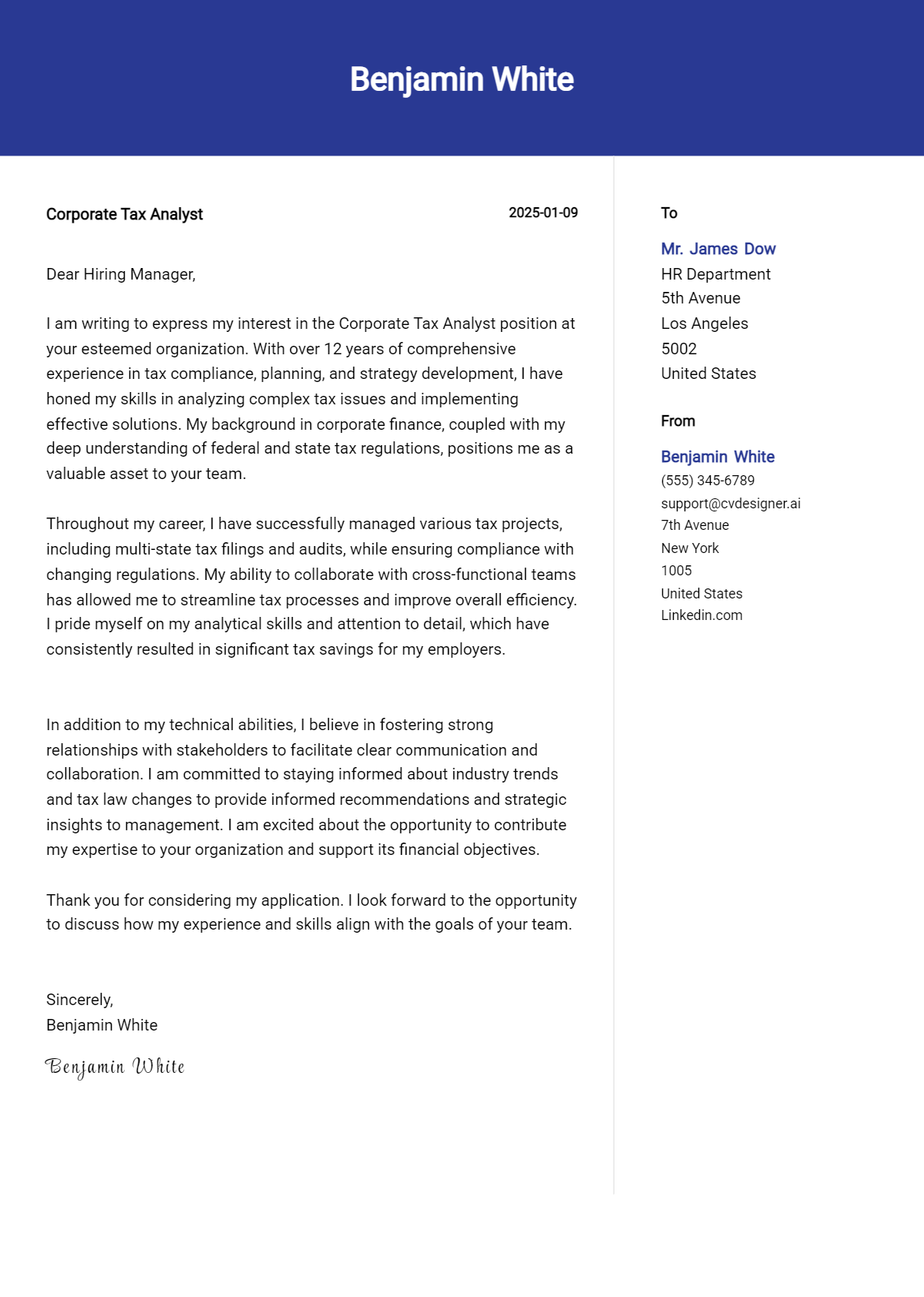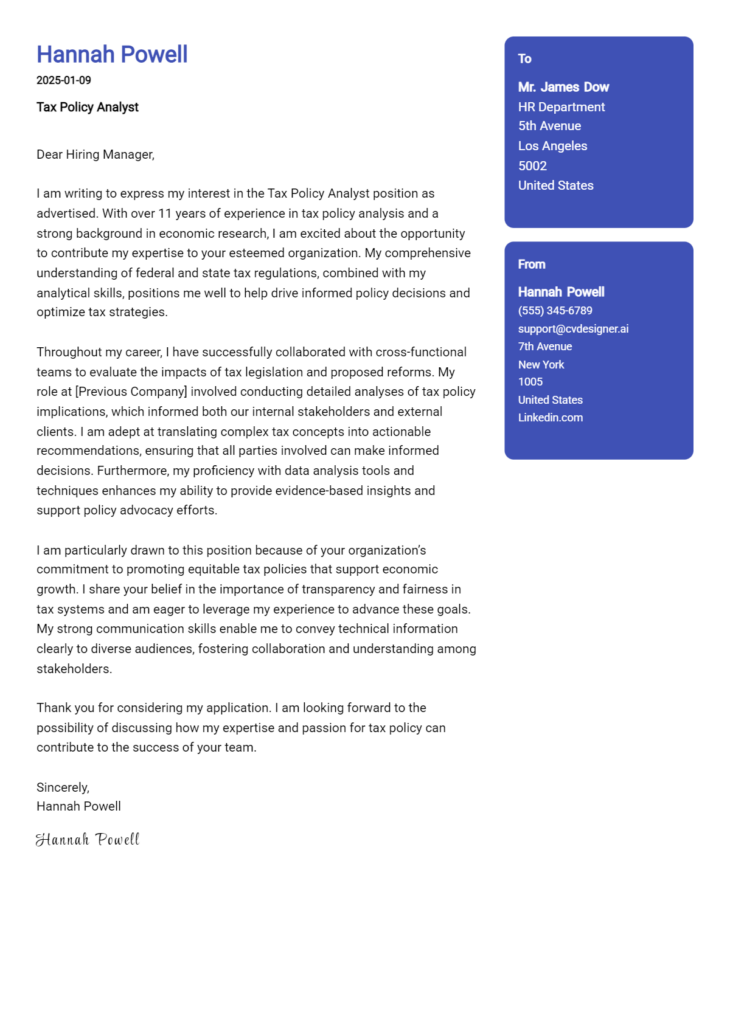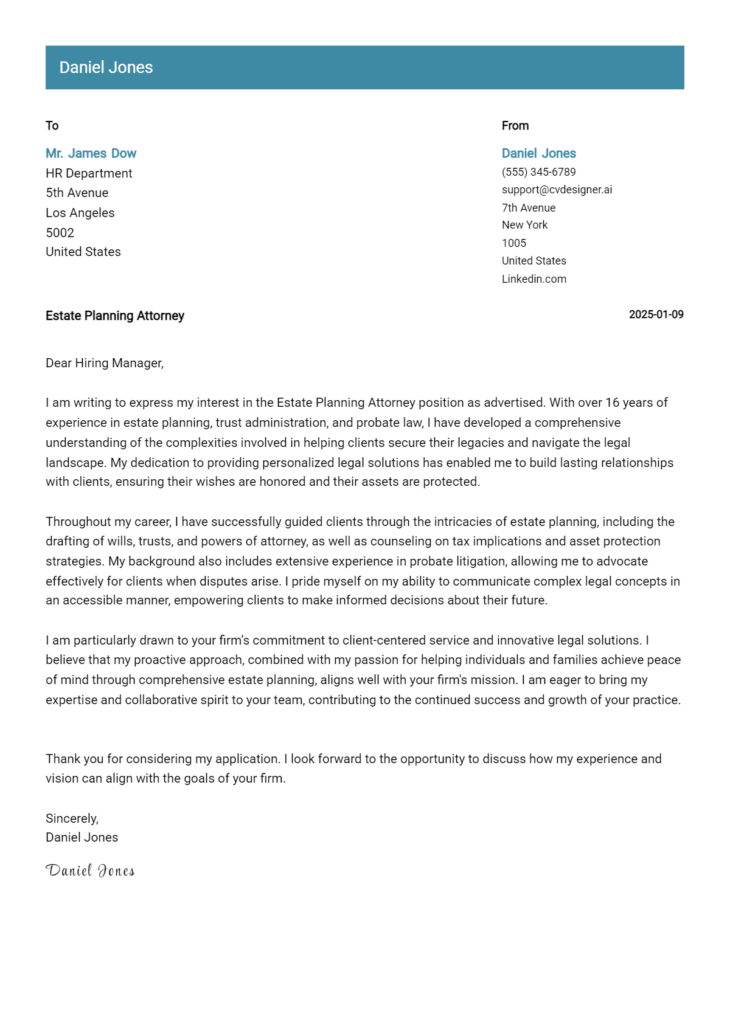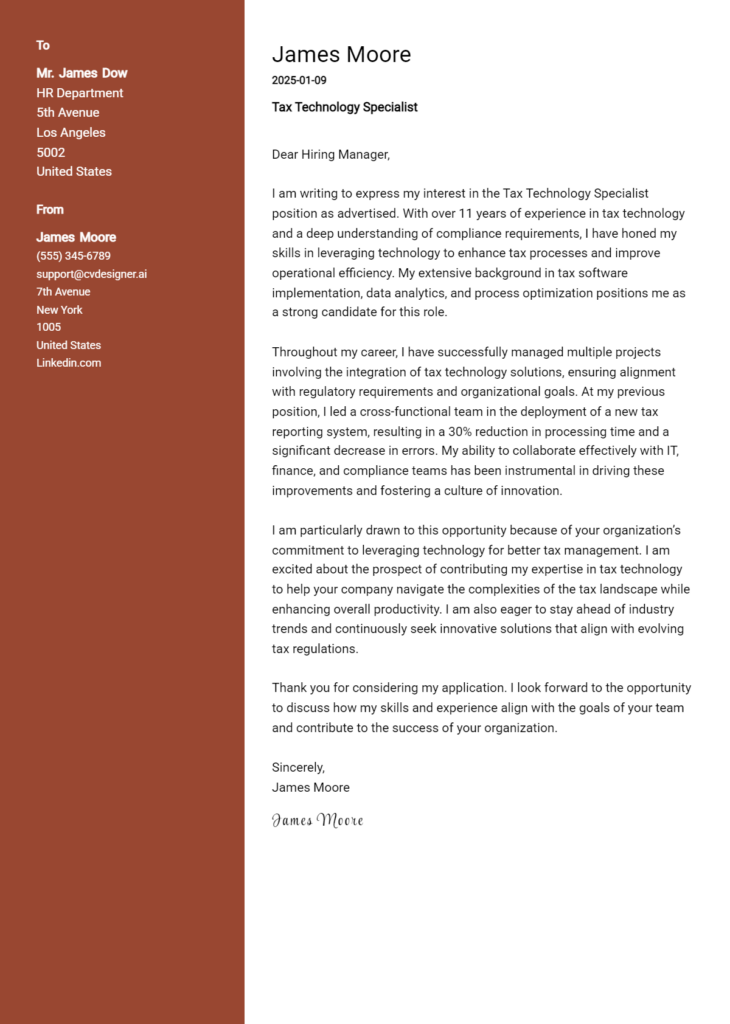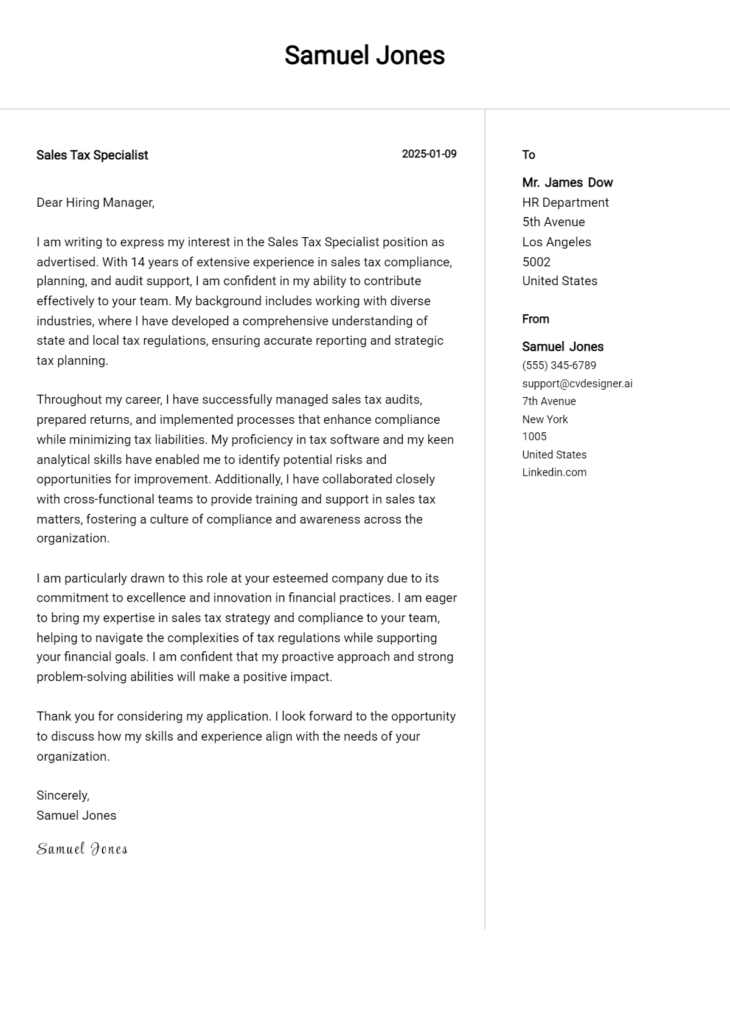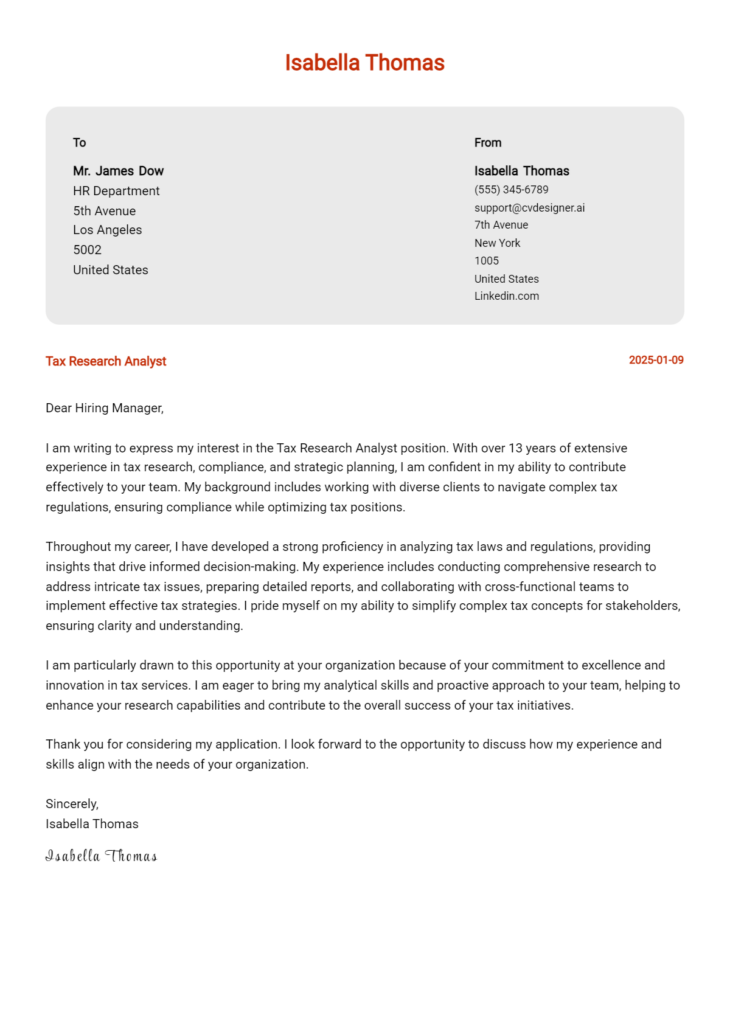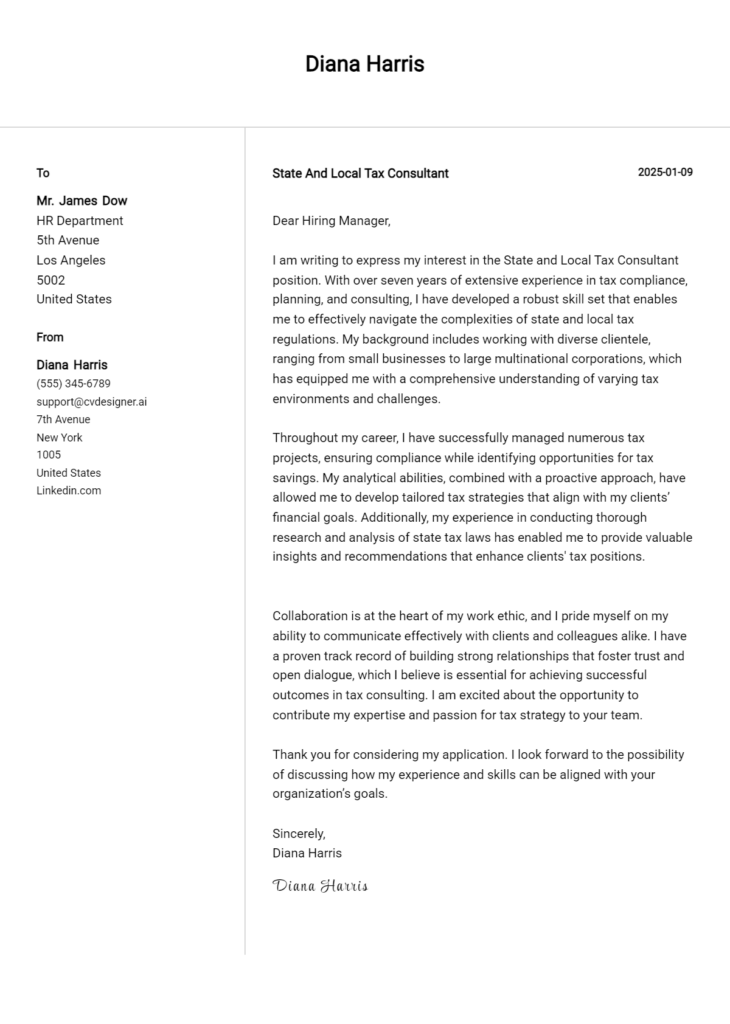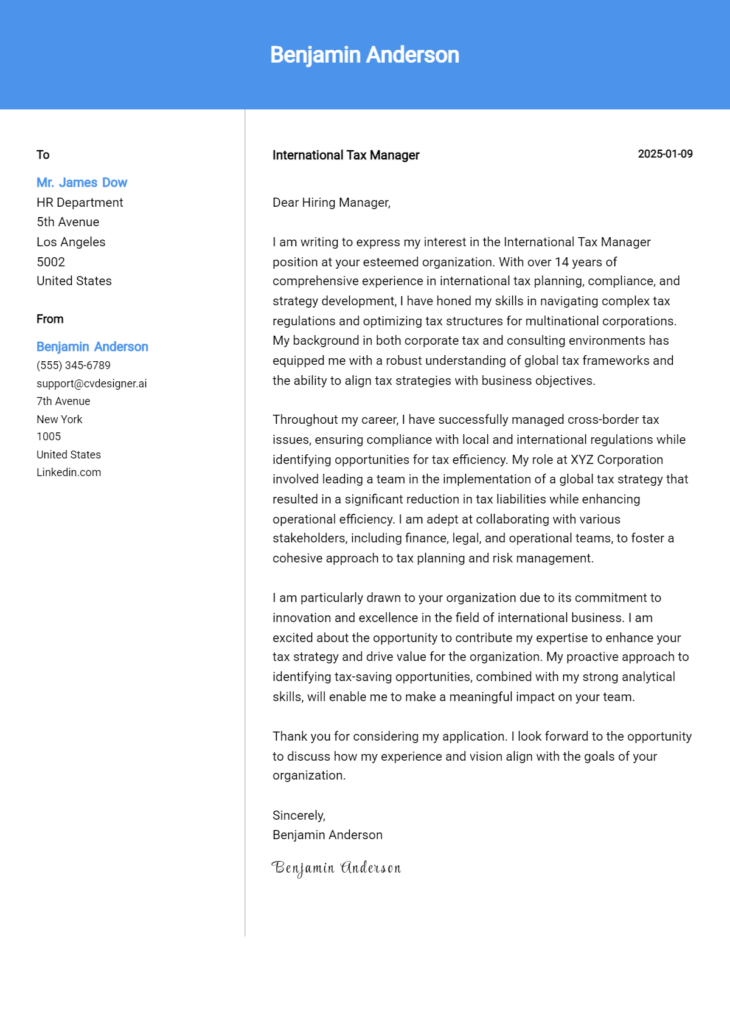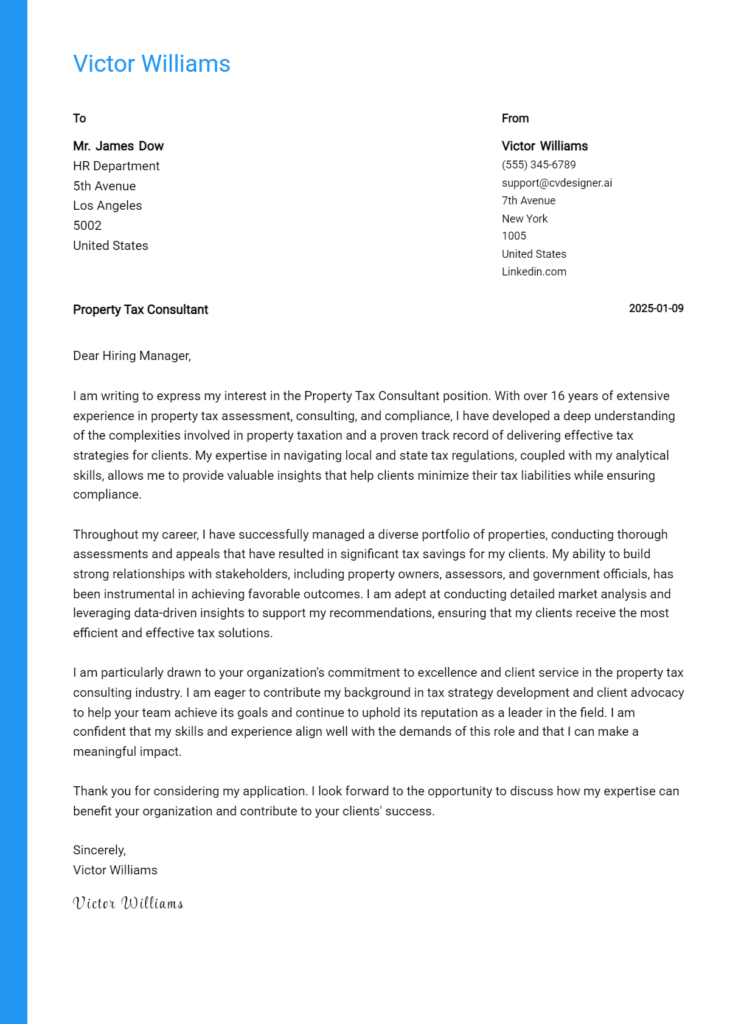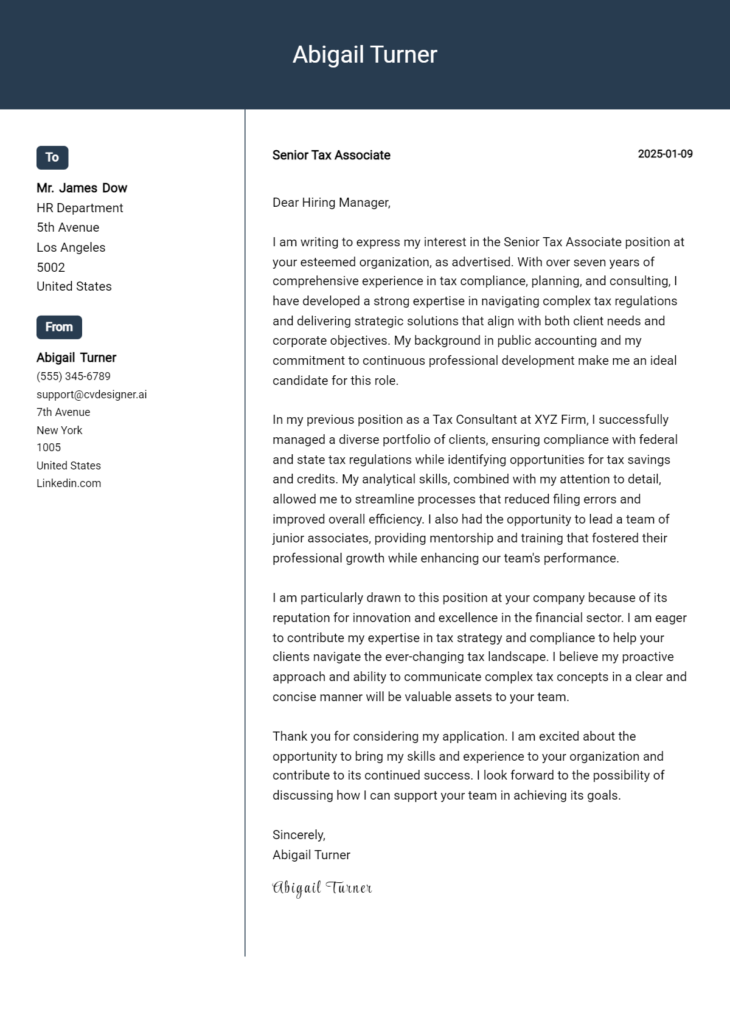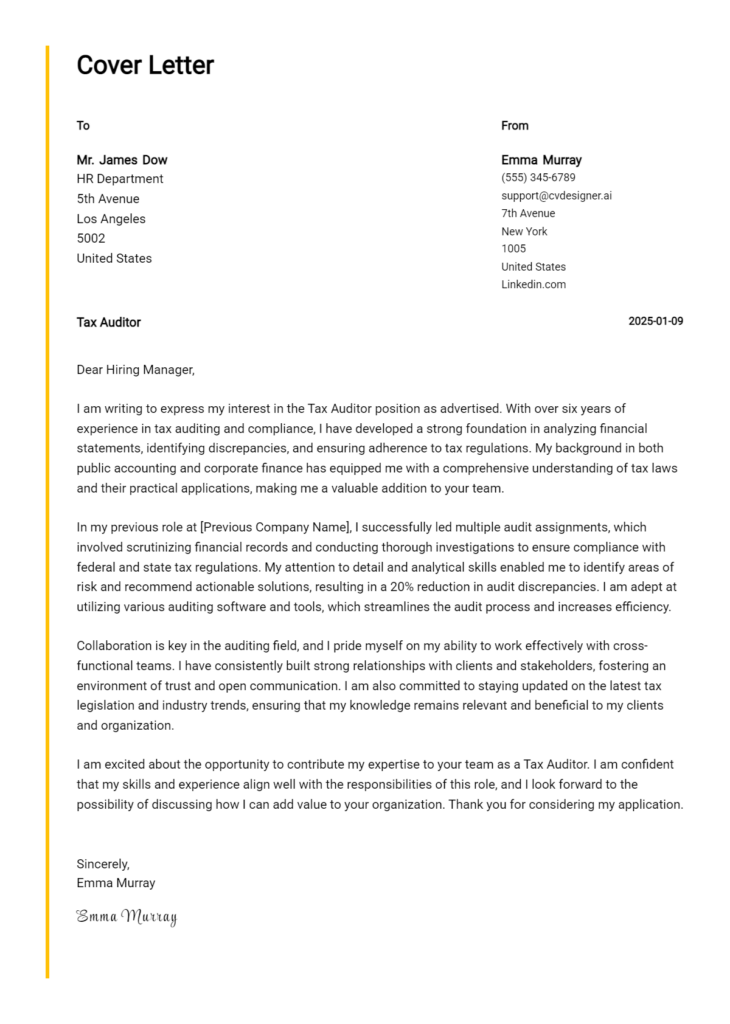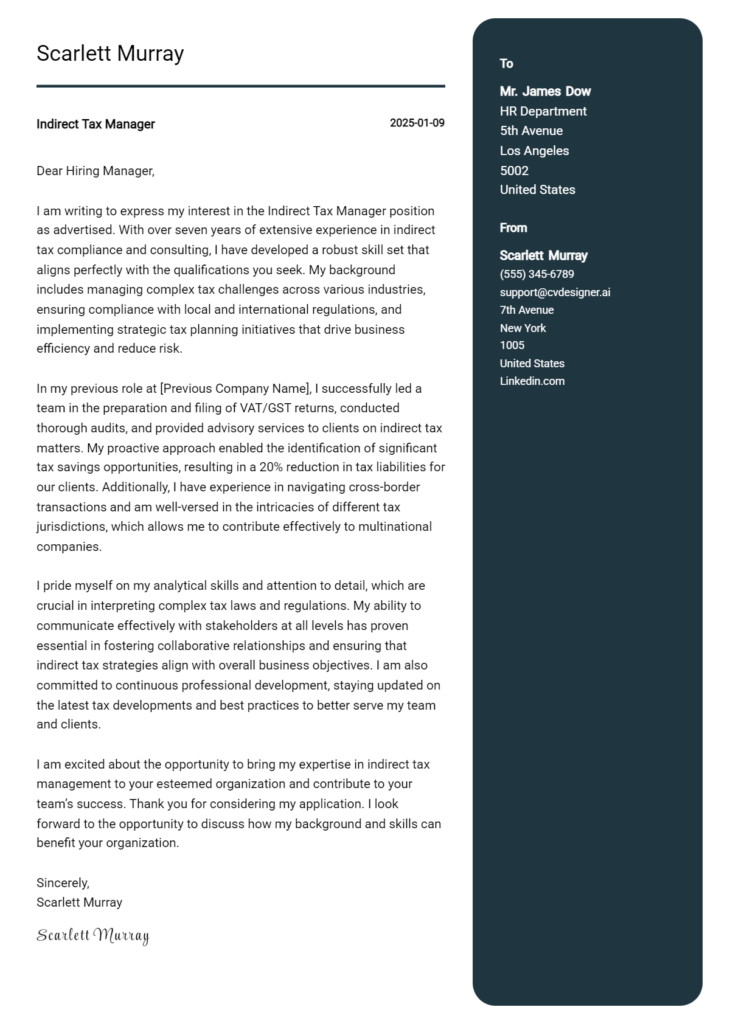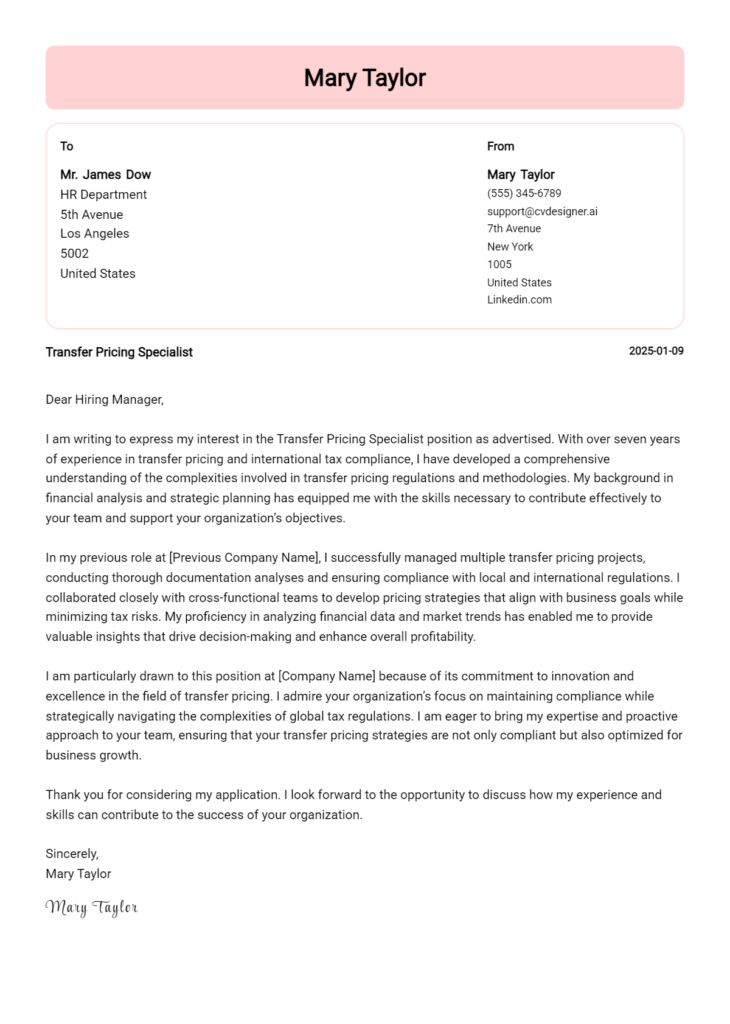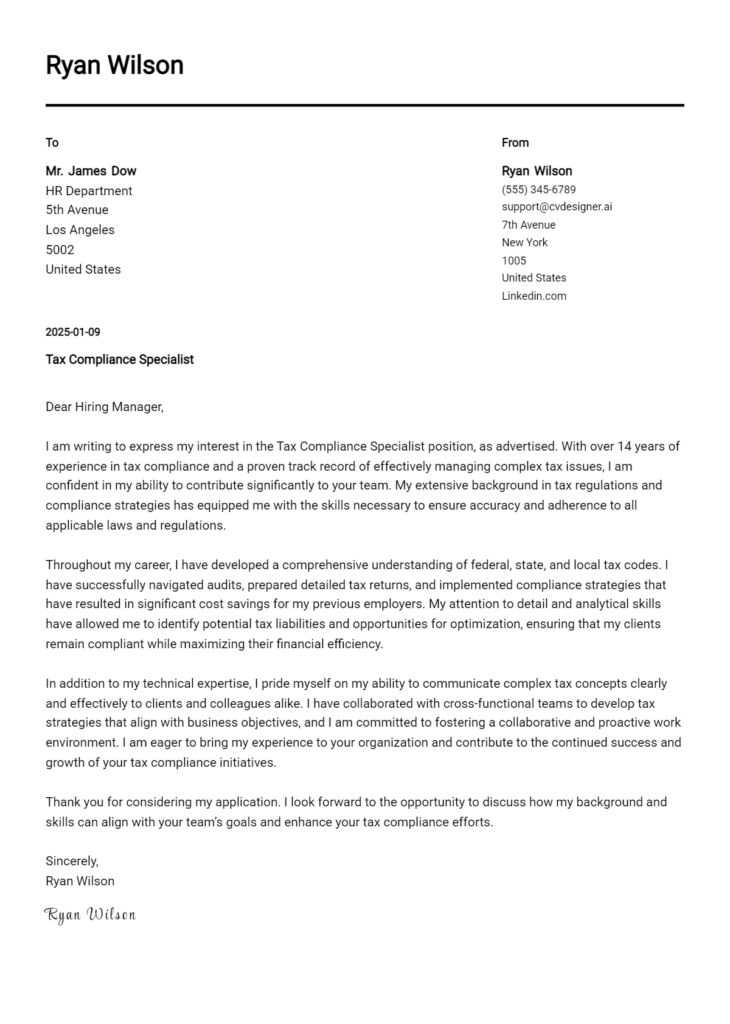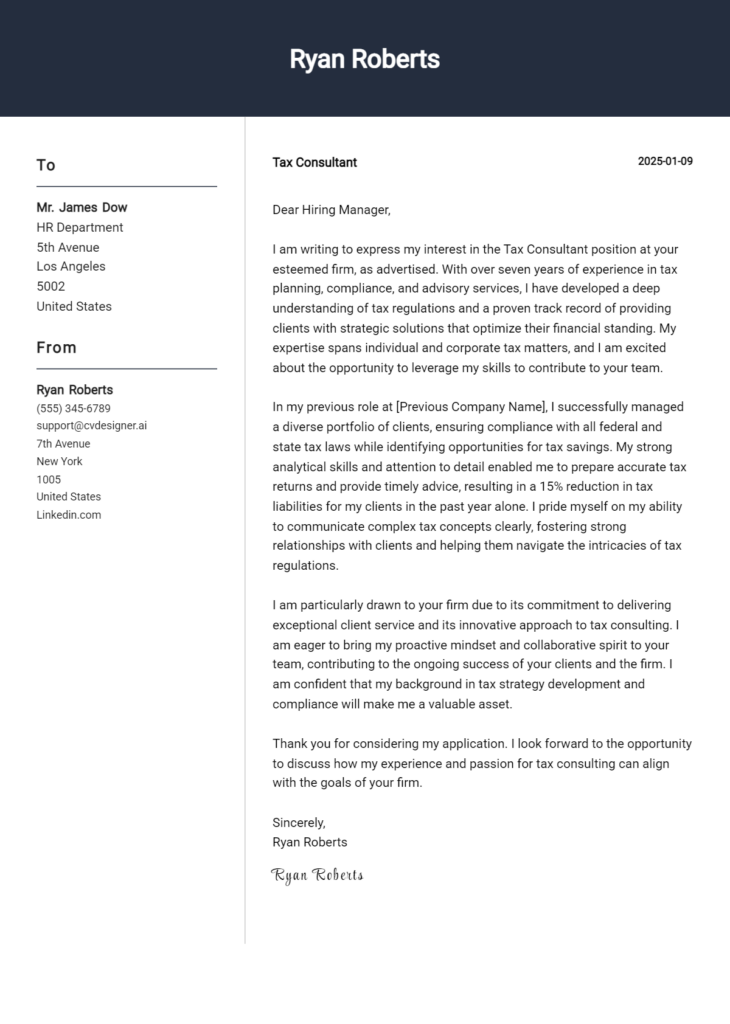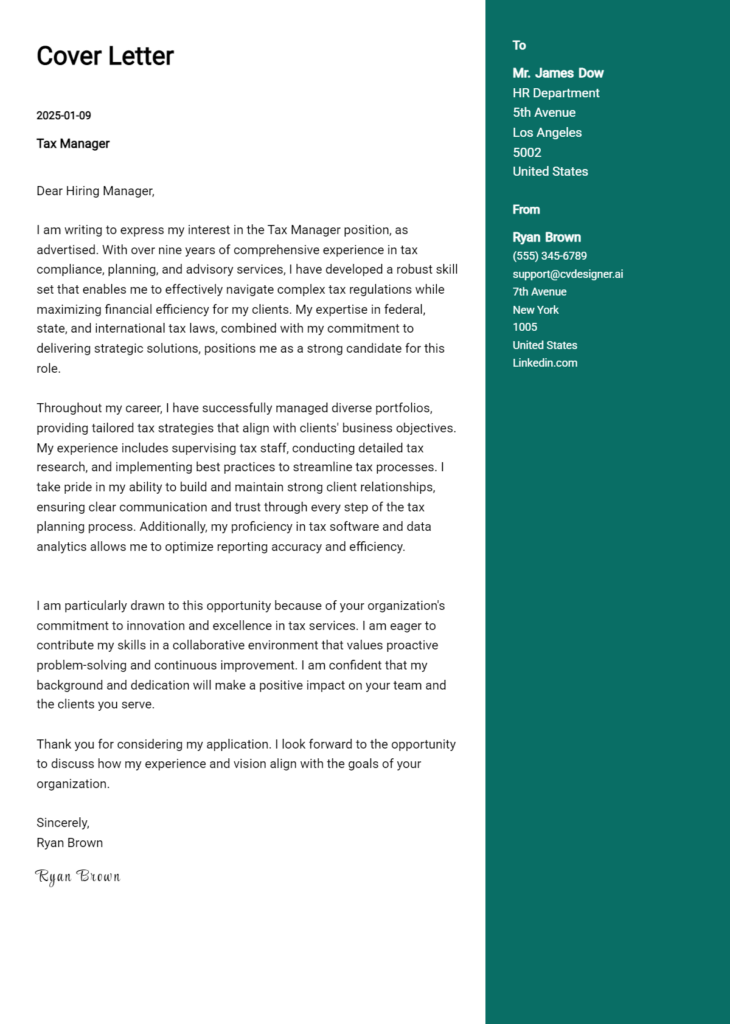Corporate Tax Analyst Cover Letter Examples
Explore additional Corporate Tax Analyst cover letter samples and guides and see what works for your level of experience or role.
How to Format a Corporate Tax Analyst Cover Letter?
Crafting a well-structured cover letter is crucial for a Corporate Tax Analyst, as it not only showcases your qualifications but also reflects your attention to detail and analytical skills. The way you format your cover letter can greatly influence a hiring manager's first impression, emphasizing your professionalism and ability to communicate effectively. In a field where precision is paramount, a meticulously organized cover letter helps convey your capability to navigate complex tax regulations and compliance issues.
In this guide, we’ll outline the key components of a professional cover letter, providing insights and examples tailored specifically for Corporate Tax Analysts.
We will cover the essential sections of your cover letter, including:
- Cover Letter Header
- Cover Letter Greeting
- Cover Letter Introduction
- Cover Letter Body
- Cover Letter Closing
Each section is integral in presenting your qualifications and professionalism. Let’s break down each part to help your application stand out in a competitive field.
Importance of the Cover Letter Header for a Corporate Tax Analyst
The header of a cover letter is crucial as it establishes the first impression of the applicant, reflecting their attention to detail and professionalism. For a Corporate Tax Analyst position, clarity and organization are vital, given the analytical nature of the role. A well-structured header should include the applicant's contact information, the date of writing, and the recipient's details, ensuring that the letter is easily traceable and accessible. An effective header not only promotes a polished appearance but also serves as a practical guide for the recipient to follow up on the application.
Strong Example
John Doe 123 Tax Street Cityville, ST 12345 (123) 456-7890 john.doe@email.com March 15, 2023 Jane Smith Hiring Manager XYZ Corporation 456 Finance Avenue Cityville, ST 12345
Weak Example
john doe 123 tax street cityville (123) 456-7890 march 15, 2023 jane smith xyz corporation
The Importance of the Cover Letter Greeting
The greeting in a cover letter is crucial as it sets the tone for the entire document and serves as the first impression to the hiring manager. A well-crafted greeting demonstrates professionalism and shows that you've taken the time to personalize your application. By addressing the hiring manager directly, you establish a connection that can engage them right from the start. It's essential to avoid generic greetings such as "To Whom It May Concern" or "Dear Hiring Manager," as these can come across as impersonal and may indicate a lack of effort in researching the company. If possible, take the time to find out the name of the hiring manager or the person responsible for the recruitment process. This small effort can significantly enhance your cover letter's impact.
Strong Greeting Example
Dear Ms. Johnson,
Weak Greeting Example
To Whom It May Concern,
Cover Letter Introduction for Corporate Tax Analyst
A well-crafted cover letter introduction is crucial for a Corporate Tax Analyst position as it serves as the first impression to the hiring manager. This opening paragraph should not only capture their attention but also convey the candidate's genuine interest in the role. By briefly showcasing relevant skills or notable achievements, the introduction sets the tone for the rest of the cover letter and establishes the candidate as a strong contender for the position.
Strong Example
Dear [Hiring Manager's Name], As a dedicated and detail-oriented Corporate Tax Analyst with over five years of experience in tax compliance and planning, I am excited to apply for the position at [Company Name]. My proven track record of successfully navigating complex tax regulations and implementing strategic tax-saving initiatives has consistently resulted in significant cost reductions for my previous employers. I am eager to bring my analytical skills and passion for tax law to your esteemed team, contributing to [Company Name]'s ongoing success in the industry.
Weak Example
To whom it may concern, I am writing to apply for the Corporate Tax Analyst position at your company. I have some experience in tax, and I think I would be a good fit. I have worked in a few different jobs and learned some things about taxes.
Cover Letter Body for Corporate Tax Analyst
The body of a cover letter for a Corporate Tax Analyst is crucial as it serves to effectively communicate the candidate's relevant skills, experiences, and the unique value they can bring to the company. This section should detail specific projects, accomplishments, or responsibilities that demonstrate the candidate's expertise in corporate tax regulations, compliance, and strategies that can positively impact the company's financial standing. By showcasing a blend of technical knowledge and practical application, candidates can illustrate their readiness to take on the role and contribute to the organization’s success.
Strong Example
I am particularly proud of a project I led last year that resulted in a 15% reduction in our overall tax liability. By conducting a thorough analysis of our existing tax strategies and identifying areas for improvement, I was able to implement new processes that not only met compliance requirements but also enhanced our financial efficiency. My experience in utilizing tax software and collaborating with cross-functional teams has equipped me with the tools to navigate complex tax codes and ensure our company optimally positions itself in a competitive market. I am excited about the opportunity to bring this proactive approach to your organization.
Weak Example
I have some experience in tax analysis and I think I can help your company. I have worked on a few projects in the past, and I know a bit about tax regulations. I believe I would be a good fit for the role, as I am willing to learn and try my best. I hope to contribute positively to your team.
Importance of the Cover Letter Closing for a Corporate Tax Analyst
The closing paragraph of a cover letter is crucial as it serves to summarize your qualifications, reiterate your enthusiasm for the position, and encourage the hiring manager to take the next steps, such as reviewing your resume or scheduling an interview. A strong closing leaves a positive impression and reinforces your fit for the Corporate Tax Analyst role, while a weak closing may undermine the overall effectiveness of your application. Below are examples of both a strong and a weak closing for a Corporate Tax Analyst cover letter.
Strong Example
Thank you for considering my application for the Corporate Tax Analyst position at [Company Name]. With my comprehensive understanding of tax regulations and my proven track record of optimizing tax processes, I am excited about the opportunity to contribute to your team. I am eager to discuss how my skills align with the goals of [Company Name] and would appreciate the chance to speak further. I look forward to the possibility of an interview and am happy to provide any additional information you may need.
Weak Example
Thanks for reading my letter. I think I might be a good fit for the Corporate Tax Analyst job, but I'm not sure. I hope you look at my resume and consider me for an interview if you have time.
Crafting an effective cover letter for a Corporate Tax Analyst position is crucial in making a lasting impression on potential employers. A well-written cover letter not only highlights your qualifications but also showcases your technical skills, problem-solving abilities, knowledge of the Software Development Life Cycle (SDLC), teamwork capabilities, and passion for continuous learning. Below are some tips that will help you create a compelling cover letter that stands out.
Cover Letter Writing Tips for Corporate Tax Analyst
Highlight Technical Skills
As a Corporate Tax Analyst, your technical expertise is vital. Clearly outline your proficiency in tax software, data analysis tools, and relevant regulations. Provide specific examples of how you've utilized these skills in past roles. This will demonstrate your readiness to tackle the technical challenges of the position.Showcase Problem-Solving Abilities
Employers look for candidates who can navigate complex tax issues. Use your cover letter to illustrate a time when you successfully resolved a challenging tax problem. Describe the situation, your approach, and the outcome. This not only highlights your analytical skills but also shows your ability to think critically under pressure.Demonstrate Knowledge of SDLC
If applicable, mention your understanding of the Software Development Life Cycle and how it relates to tax processes. Discuss any experience you have with tax software development or implementation projects. This will showcase your comprehensive understanding of how technology can enhance tax operations.Emphasize Teamwork and Collaboration
Tax analysis often requires working with various departments. Include examples of successful collaborations with cross-functional teams. Highlight your communication skills and ability to work effectively in a team environment, as this is essential for fostering a productive workplace.Convey a Passion for Continuous Learning
The tax landscape is constantly evolving, and continuous learning is essential for success. Share how you stay updated with the latest tax regulations and industry trends. Mention any relevant certifications or courses you are pursuing or have completed. This commitment to professional development will resonate with employers looking for proactive candidates.
By following these tips, you can craft a cover letter that effectively showcases your qualifications for the Corporate Tax Analyst role. For additional resources, consider using cover letter templates or a cover letter builder to help structure your content.
Common Mistakes to Avoid in a Corporate Tax Analyst Cover Letter
Crafting an effective cover letter is crucial for standing out as a Corporate Tax Analyst candidate. Avoiding common mistakes can significantly enhance your chances of making a positive impression. Here are some common pitfalls to steer clear of:
- Generic Content: Using a one-size-fits-all approach can make your cover letter feel impersonal. Tailor your letter to the specific role and company to demonstrate your genuine interest.
- Neglecting Key Skills: Failing to highlight relevant tax-related skills can leave your qualifications overlooked. Make sure to emphasize your expertise in corporate tax laws and compliance.
- Ignoring Formatting: A poorly formatted letter can detract from your message. Follow a professional cover letter format to ensure clarity and readability.
- Typos and Grammatical Errors: Spelling mistakes can undermine your professionalism. Always proofread your cover letter or use tools to check for errors before submitting.
- Being Too Vague: Providing vague statements about your experience can weaken your application. Use specific examples of your accomplishments and how they relate to the position.
- Overly Lengthy Letters: A cover letter should be concise. Aim for a one-page letter that effectively communicates your qualifications without unnecessary detail.
- Lack of Enthusiasm: A monotone approach can make your letter forgettable. Inject some enthusiasm about the role and the company to engage the reader.
For more guidance, check out our cover letter examples to inspire your writing and ensure your cover letter stands out in the competitive job market.
Cover Letter FAQs for Corporate Tax Analyst
What should I include in my cover letter for a Corporate Tax Analyst position?
In your cover letter for a Corporate Tax Analyst position, you should include a brief introduction that captures the hiring manager's attention. Follow this with a summary of your relevant experience, emphasizing your expertise in tax regulations, compliance, and analytical skills. Highlight specific achievements, such as successful audits or tax-saving strategies you've implemented. Additionally, mention any relevant certifications (e.g., CPA, EA) that reinforce your qualifications. Conclude with a strong closing statement reiterating your enthusiasm for the role and expressing your desire for an interview.
How can I demonstrate my knowledge of tax regulations in my cover letter?
To effectively demonstrate your knowledge of tax regulations in your cover letter, provide concrete examples of your experience with specific tax codes or legislation relevant to the role. For instance, discuss your familiarity with IRS regulations, state tax laws, or international tax compliance if applicable. You can also mention any projects where you researched tax implications or advised on tax strategies. Including numbers or outcomes, such as successfully reducing tax liabilities for previous employers, can further illustrate your expertise and effectiveness in this area.
Is it important to tailor my cover letter for each application?
Yes, tailoring your cover letter for each application is crucial. A generic cover letter can come across as impersonal and may fail to highlight your unique qualifications for the specific position. Research the company’s values, culture, and any recent developments in their business that relate to tax matters. Use this information to customize your cover letter by aligning your skills and experiences with the company’s needs. This approach not only demonstrates your genuine interest in the position but also shows that you’ve taken the time to understand the organization, increasing your chances of standing out.
Should I include keywords from the job description in my cover letter?
Absolutely, including keywords from the job description in your cover letter is a strategic way to align your skills with what the employer is seeking. Many companies use applicant tracking systems (ATS) to screen cover letters and resumes, and incorporating relevant keywords can help ensure your application gets noticed. Identify specific terms related to tax compliance, financial analysis, or software tools mentioned in the job posting. Seamlessly integrate these keywords into your cover letter while still maintaining a conversational tone, as this will enhance your visibility and demonstrate your suitability for the Corporate Tax Analyst role.
Build your Cover Letter in minutes
Use an AI-powered cover letter builder and have your letter done in 5 minutes. Just select your template and our software will guide you through the process.

